 Petzlover
Petzlover Old English Sheepdog is originated from United Kingdom but South Russian Ovcharka is originated from Russia. Old English Sheepdog may grow 6 cm / 2 inches shorter than South Russian Ovcharka. Old English Sheepdog may weigh 7 kg / 15 pounds lesser than South Russian Ovcharka. Both Old English Sheepdog and South Russian Ovcharka has almost same life span. Old English Sheepdog may have more litter size than South Russian Ovcharka. Both Old English Sheepdog and South Russian Ovcharka requires Moderate Maintenance.
Old English Sheepdog is originated from United Kingdom but South Russian Ovcharka is originated from Russia. Old English Sheepdog may grow 6 cm / 2 inches shorter than South Russian Ovcharka. Old English Sheepdog may weigh 7 kg / 15 pounds lesser than South Russian Ovcharka. Both Old English Sheepdog and South Russian Ovcharka has almost same life span. Old English Sheepdog may have more litter size than South Russian Ovcharka. Both Old English Sheepdog and South Russian Ovcharka requires Moderate Maintenance.
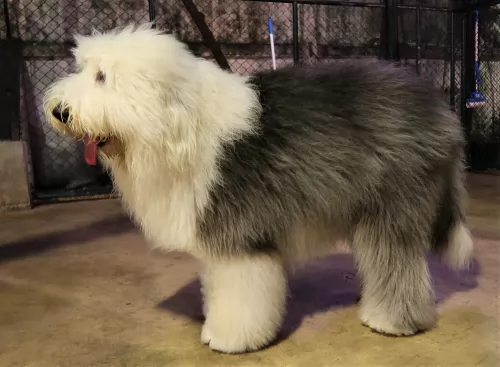 The origin of the Old English Sheepdog is unclear as records weren’t kept. However there are some aspects that suggest the dog originated in the 19th century and that the Scottish Bearded Collie had a significant part in the development of this dog which hails from England.
The origin of the Old English Sheepdog is unclear as records weren’t kept. However there are some aspects that suggest the dog originated in the 19th century and that the Scottish Bearded Collie had a significant part in the development of this dog which hails from England.
It is also believed that the Russian Owtchar was involved in the development of the Old English Sheepdog. The dog was recognized by the American Kennel Club in 1888. In 1904, the Old English Sheepdog Club of America was also founded.
The shape of the dog has changed very little over the years and it was in the 1880s that the dog was exported to the United States.
 Known also as the South Russian Sheepdog or the Ukranian Shepherd Dog, the South Russian Ovcharka’s history isn’t well established, and there are different stories to its history.
Known also as the South Russian Sheepdog or the Ukranian Shepherd Dog, the South Russian Ovcharka’s history isn’t well established, and there are different stories to its history.
Whatever their history, this large dog is closely related to the wolf and has also been crossed with sight hound dogs. Their numbers have been under threat when their role as herding dog was no longer needed for rural life.
It was in the 1920s however that the breed’s numbers were restored and the UKC officially recognised the South Russian Ovcharka in 1996.
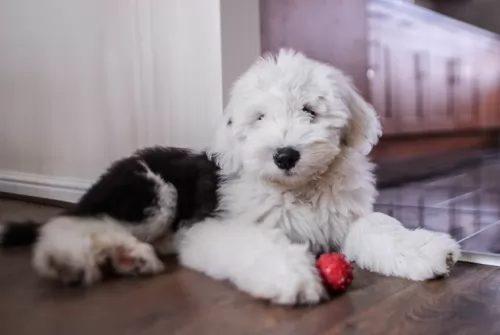 The Old English Sheepdog is a large dog standing at between 50 and 60cm and weighing between 27 and 45kg.
The Old English Sheepdog is a large dog standing at between 50 and 60cm and weighing between 27 and 45kg.
He is muscular with a broad bottom and hip area. The head is also large and the small ears are carried flat. The tail has always been docked, giving the dog a large panda-bear look to him, but these days the tail is often left long, and the dog loses that square compact look.
When the tail is left long it is well feathered. The coat can become fairly long and is quite harsh and wavy to straight. The coat is essentially grey with white hair over the head area. The puppies are born with their hair being black and white, and later on the traditional grey coloring comes in.
What is quite interesting with this dog is that it stands lower at the shoulder than at the loins, so just like a Panda bear, he also lopes or walks in a bear-like fashion.
The Old English Sheepdog isn’t an aggressive dog. He is social, intelligent and entertaining for his human family, whom he loves to spend time with.
He is an energetic dog too and he would prefer a country setting where there are large fields to run in as opposed to living on a tiny property in the city. He is an adaptable dog though, and will slot into life in the city or suburbs, so long as he is well exercised.
Train him and socialize him and he will become an obedient, amicable pet to have around.
 A large, big boned, well muscled herding dog, the South Russian Ovcharka stands at between 62 and 66cm in height and weighs between 46 and 52kg.
A large, big boned, well muscled herding dog, the South Russian Ovcharka stands at between 62 and 66cm in height and weighs between 46 and 52kg.
The dog has a thick, fairly coarse, weather-proof coat that can become long and this coat has always protected them from the harsh Russian winters.
He has small, floppy ears and the tail is medium length and also covered in thick fur.
These dogs need a lot of exercise and if you keep one as a pet he will need a lot of space to run and play. He guards his property too and makes a good watchdog.
He isn’t suited to living in small spaces in the city. He is a dominant, independent and strong willed dog so training and socialization will be important if you don’t want him to be unruly.
With the right kind of training, the South Russian Ovcharka can get along with pets and children in the home. He isn’t aggressive but he has strong guardian characteristics.
The first time dog owner would need to be firm, strong, confident, consistent and kind to handle this strong willed dog.
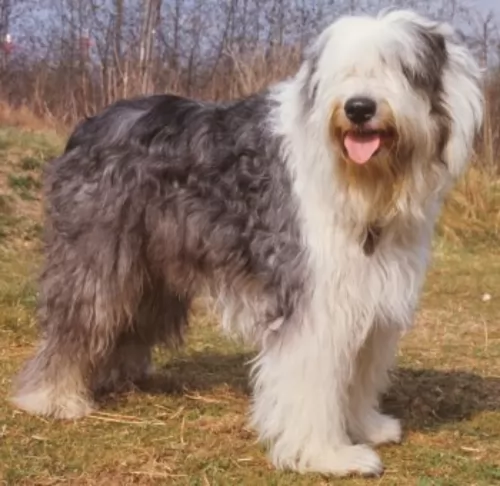 The Old English Sheepdog is the ideal dog for a family pet. They love spending time with their human family and are affectionate and loyal, getting on well with children as well as other pets.
The Old English Sheepdog is the ideal dog for a family pet. They love spending time with their human family and are affectionate and loyal, getting on well with children as well as other pets.
From the time he is a puppy, you can see that he is fun-loving and easy going while also being intelligent. He is also a guardian and wants to protect his human family.
Provide him with the opportunity to get out into the country sometimes if you don’t live on a farm because he is essentially a farm dog. He used to be a herding dog and likes to be busy. Treat him well and have him trained and socialized and he’ll make you a superb pet.
 The South Russian Ovcharka may well be independent and strong headed but there is nothing that a little bit of training and socialization can’t do.
The South Russian Ovcharka may well be independent and strong headed but there is nothing that a little bit of training and socialization can’t do.
He is intelligent and will pick up some obedience commands easily. He is is dog that will like a strong, firm, consistent owner - someone who likes to include him in all the family activities.
He can get on with children but is better suited to life on a larger property as opposed to living in a small city place. Treat him with firmness and fairness and you’ll get yourself an excellent pet and companion.
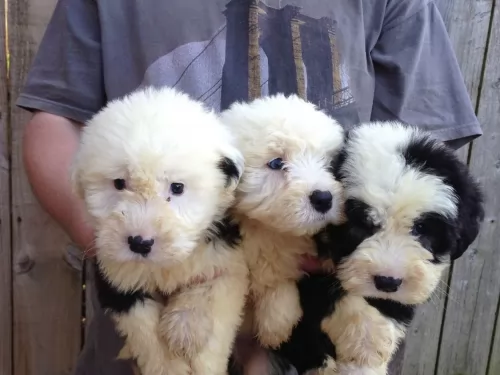 It is estimated that the beautiful Old English Sheepdog can live to be about 10, 11 or 12 years of age if he is looked after well. Just like with other dog breeds though, this particular dog is also prone to some of the common dog diseases there are.
It is estimated that the beautiful Old English Sheepdog can live to be about 10, 11 or 12 years of age if he is looked after well. Just like with other dog breeds though, this particular dog is also prone to some of the common dog diseases there are.
Some of these diseases include hip dysplasia, diabetes, eye diseases and deafness along with some skin problems.
As a chronic disease, Diabetes can affect dogs as well as other animals and humans. Diabetes in dogs can’t be cured but it can be managed, with Diabetes Mellitus being the kind of diabetes most seen in dogs. Whatever kind of diabetes your pet has, the negative effects remain the same.
It can be devastating when your dog has been with you for about 10 years, to discover that he has cancer. Of course, cancer is the leading cause of death found in dogs older than the age of 10.
Many cancers are curable if you catch them early. Malignant lymphoma is a common cancer with dogs but there are other cancers too. The warning signs of cancer in dogs are much the same as what you get with humans. You’ll discover a lump or even an injury that won’t heal. There could also be abnormal bleeding.
There are many different kinds of skin problems seen in dogs, some of which are more common than others. You’ll notice your dog licking a part of the body so that the hair disappears and the skin becomes exposed.
There are skin problems started because of inadequate diet and lack of nutrition. There are plenty of commercially manufactured pet foods that don’t have the right amount of vitamins and minerals your pet needs. Always buy a good quality one to fight these very aggravating skin allergies. A vet may give hydrocortisone products but many dog owners these days try to treat their dogs with natural products.
 This large breed has a lifespan of 9 to 11 years. Some of the health conditions to which this big dog can succumb are -
This large breed has a lifespan of 9 to 11 years. Some of the health conditions to which this big dog can succumb are -
This is something that affects many dogs, but particularly large dogs. When the hips haven’t formed properly, it can lead to pain, disability and arthritis.Lifestyle changes can help, like making sure your dog doesn’t pick up too much weight. For pain management you will need to get your pet to the vet.
Also known as Gastric Dilatation. The dog’s stomach fills with gas and can twist, and this in itself can be fatal. As soon as you see your pet pacing restlessly and he has a swollen stomach, he will need to get to the vet just as soon as possible.
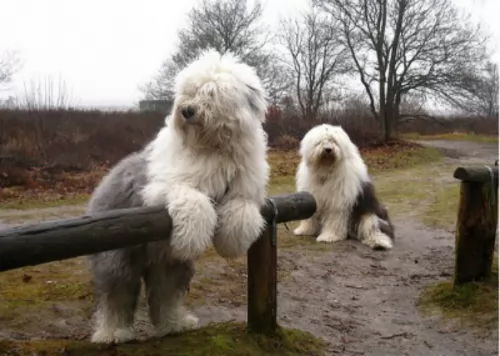 Food allergies are caused by your dog eating food with ‘bad’ ingredients which don’t agree with him. Make sure your pet has a wholesome diet.
Food allergies are caused by your dog eating food with ‘bad’ ingredients which don’t agree with him. Make sure your pet has a wholesome diet.
Invest in the very best quality commercially manufactured food. Home-made food is always a wonderful treat for any dog but it needs to be kept simple. No exotic, spicy foods and no suddenly changing your pet’s diet.
Simple, nutritional boiled chicken, brown rice or pasta and vegetables such as sweet potato, carrots and spinach added into his kibble as a treat will do wonders for your pet and he will thank you for keeping his meals tasty and simple. A little bit of raw meat added in occasionally can also do him the world of good. Fresh, cool water must always be available.
The Old English Sheepdog is quite a high maintenance dog, what with that long hair and all, and some owners of this dog prefer to take him to the parlor to have the hair sheared and wash, otherwise it could become a mammoth task for a dog owner.
If you opt to keep the hair long, you may end up having to be constantly brushing your pet’s coat to prevent it tangling. Not only that, if you live in a hot area, cutting the hair can help towards keeping the dog cool.
The ears of your dog should be checked regularly for infection as well as the eyes, and keep the nails clipped as well.
 The long coat is certainly going to need a good brush at least twice a week as it can so easily become matted.
The long coat is certainly going to need a good brush at least twice a week as it can so easily become matted.
Because he has floppy ears, you will need to check inside the ears that they aren’t showing signs of redness, indicating the possibility of a ear infection. Check at the same time for ticks and fleas.
This dog is going to need a good deal of exercise to keep him content. He will love a long walk out and about. Robust games will also need to be provided. It’s why he isn’t looked upon as a dog suited to the city. He needs a lot of space and can become frustrated and destructive if his exercise needs aren’t met.
A dog is part of the family and he therefore deserves a good meal too. Good food is beneficial as it means your dog is less likely to get sick.
Like many dog owners, you’ll no doubt appreciate the convenience of commercially manufactured dog foods. You’ll need to choose the best one though because the inferior ones are made up of bad ingredients – fillers that have no goodness whatsoever.
To provide your South Russian Ovcharka with a tasty treat, try and give him some home-made food. Boiled chicken, rice or pasta, sweet potatoes, carrots and spinach are simple and tasty and won’t trouble your dog’s stomach.
Chop some of it up and add a small portion of this into his dry kibble twice a week. Your dog’s wagging tail will tell you how much he loves it.
To avoid skin infections, try to include some raw meat into his diet too when you can. Make sure your dog has a constant supply of fresh, cool water.